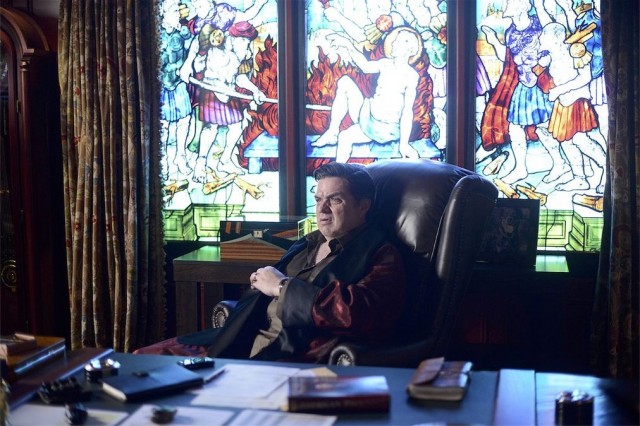Fargo Season 1, Episode 6 “Buridan’s Ass”
Written by Noah Hawley
Directed by Colin Bucksey
Airs Tuesdays at 10pm ET on FX
To understand how Fargo is interpreting its titular philosophic quandary, one need look no further than the opening two scenes. In the episode’s cold open, we watch a fish get chosen, gutted, fried, and served to the assumed head of the crime syndicate who previously employed Sam Hess. He then tells his associates that he wants whoever killed Hess to be “dead” (not apprehended; that’s just not good enough here), because, well, “kill or be killed.” And as he chows down on the fish’s head, we suddenly cut to Don, trapped in his pantry waiting for Malvo to return—like the other fish in the tank at the episode’s start, Don is lying static in the water, just waiting for a predator to come by and pick him off, unless he acts in some fashion.
He doesn’t, of course, and it’s that inaction that sends “Buridan’s Ass” screaming down the railroad to Hell, as the storm Fargo‘s alluded to for weeks finally arrives, clouding the town in a thick fog, allowing all the darkness spreading around town to hide itself in the blinding whiteness of the blizzard. What happens to Don is very, very unfortunate, but in the world of Fargo, those who will not choose become the asses of the world (in the Buridan’s Ass story, a donkey dies when it can’t decide between food or water and starves) and all season, we’ve watched Don babble away while Malvo gathered himself and moved forward. In the world of Fargo, it’s not those who act that necessarily get punished, it’s those comfortable with inaction that are punished the most, as “Buridan’s Ass” quickly devolves from crime drama to all out slaughter-fest, with Biblical rains of fish and Molly and Gus attempting to hunt down Malvo once and for all.
Of course, these plans all fail to varying degrees—the only person to execute a plan from beginning to end in “Buridan’s Ass” is Lester, and that’s because rather than sit and play the role of simple human, he embodies the spirit of the wolves Malvo mentions on the phone to Stavros: the wolves are coming, and those who stand around wanting and wishing are only going to be consumed by its darkness. And for most, turning to God is not an option anymore. Even after he returns the money to its original home, Stavros comes across the dead bodies of his father and son, violently killed in a crash when the local snowfall was suddenly replaced by a hailstorm of flailing fish, teaching Stavros a little lesson in Biblical come-comeuppance: sins can be forgiven, but they’re never forgotten and after 20 years of waiting for Stavros to make things right with his supposed Lord, it’s come to light that his transgression (well to him, it was a sign of divine assistance) has not been forgotten.
Contrasted with Lester’s scenes breaking out of the hospital (to plant his murder weapon in his brother’s possession, in order to frame him), the surrounding events of “Buridan’s Ass” give great weight to the psychological differences between action and inaction, judging those not by what they do necessarily, but how long it takes them to do it. Even Malvo waits a little too long to act: as he leaves the crime scene he creates by staging Don as a suicidal murderer, he pauses to laugh at the situation and gather himself before moving forward, allowing Mr. Numbers and Mr. Wrench to ambush and nearly kill him. Of course our Satanic predator is no stranger to this ideal, using it to his advantage: as Mr. Numbers attempts to find him in the swirling snow, Malvo fakes an injury (with his own, very real blood) and pounces on him, getting the information he needs and moving on in terrifying fashion (he’s got an automatic assault rifle in his possession now; can he get any more frightening at this point?).
And then the episode’s big surprise drops: our own lovable Buridan’s Ass Gus fires a warning shot into the fog after Molly runs off against his warnings to stay and wait for help, or at least until they understand what’s going on. But Molly’s bravery (and professional curiosity) immediately throws her into action: a quickly-made decision that will most likely haunt Gus forever. When gunshots are fired (barely heard through the whizzing snow and sound of the wind, a dazzling set piece unlike anything I’ve seen on television before), Gus screams he’s a cop and fires off a random round, pegging Molly and leaving her for dead (presumably? Can they actually kill of their best character halfway through?). Gus’s inaction—as it did in the pilot—once again costs him dearly, a consequence handed down to him by the metaphysical powers at play in the world of Fargo, and delivered by writer Noah Hawley to devastating effect.
At our core, we are predatorial creatures: sometimes we hunt animals, sometimes we hunt information, and sometimes, we hunt each other. In this raw, unfiltered landscape of Fargo (one often detailed by the wildly violent stories Malvo tells various characters), there’s no use in trying to define good or bad; there are only those who act, and those who don’t—and those who don’t are those most likely to end up as victims of natural selection. Gus may want people to think about the world in terms of good and bad, but that makes for a sad, very depressing world to live in, one that just got a whole lot darker thanks to what is most likely the best episode of television in 2014 (at least so far).
— Randy


